What is Butter?
Butter is a kitchen staple, but its behavior can change when paired with acidic ingredients. For instance, lemon juice curdles butter due to its low pH and high acidity. This article explores how this happens and ways to prevent it.
Table of Contents
The Role of Fat in Butter
Butter’s high fat content, usually around 80%, gives it its smooth texture and stability. The fat is the main part that holds everything together, forming a mixture that keeps the other ingredients combined. This fat is what makes butter melt easily and adds richness to food. However, because of its makeup, butter can break down when exposed to acids like lemon juice.
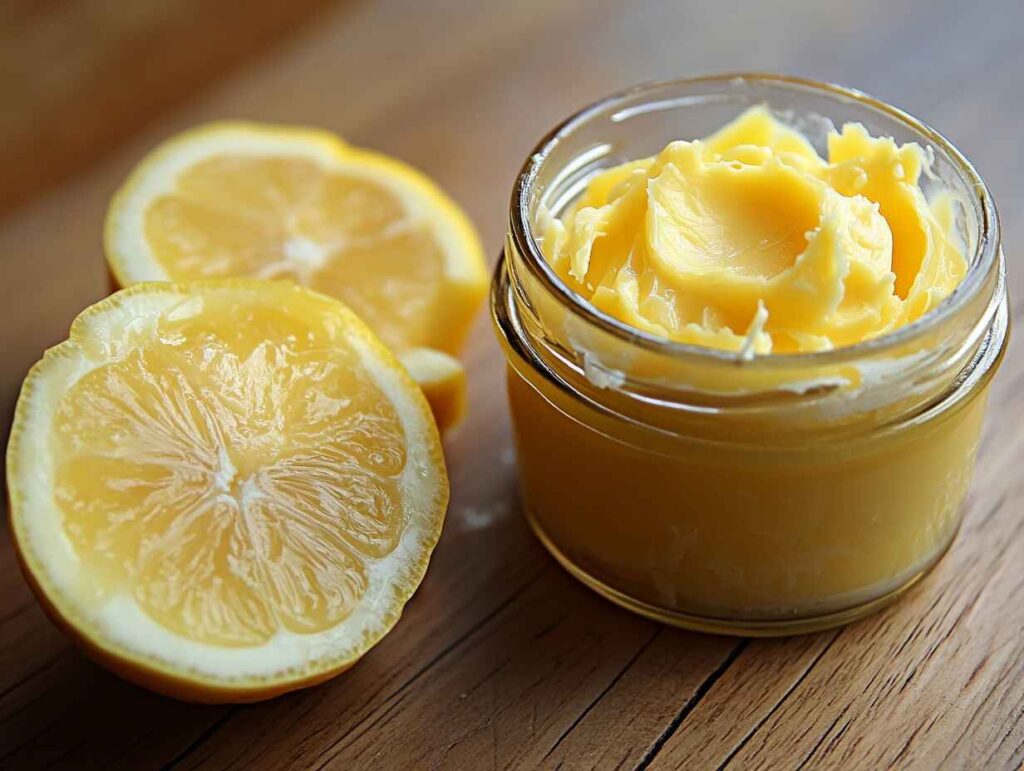
Would you like to explore how lemon juice curdles butter interacts with butter?
What Makes Lemon Juice Acidic?
Lemon juice curdle butter is acidic due to its high concentration of hydrogen ions (H⁺), which are released from organic acids present in the juice. The primary contributor to its acidity is citric acid, a weak organic acid that gives lemons their tangy flavor and low pH, typically ranging between 2 and 3.
The Role of Citric Acid in lemon juice curdles butter
Citric acid is the main acid found in lemon juice curdles butter, accounting for its sour taste and preservative qualities. It plays a significant role in culinary and chemical interactions due to its ability to alter pH levels and interact with proteins and fats in various food ingredients, including butter.
The Science Behind lemon juice curdles butter
How Does Butter Curd Form?
Butter curds form when the delicate emulsion of fat and water in butter breaks down. This can occur due to external factors like heat, agitation, or changes in pH. When the emulsion destabilizes, the fat separates from the liquid, resulting in a curdled texture.
The Effects of Heat and Acidity on Butter
Heat can cause the fat to melt, while acidity lowers the pH, disrupting the stability of the emulsion. Acids like lemon juice accelerate this process by altering the proteins and destabilizing the fat matrix, leading to visible separation or clumps.
The Effect of lemon juice curdles butter
Why Does Lemon Juice Affect Butter?
The reason lemon juice curdles butter is all about science. Butter is a mix of fat and water held together. When lemon juice is added, its acidity changes the balance, and the butter separates.
The Role of Emulsification in lemon juice curdles butter
Emulsification is the process that binds fat and water in butter. When lemon juice is added, the acidic nature disrupts this bond, causing the fat to separate from the water. The breakdown of emulsification leads to curdling, which is why butter reacts visibly to lemon juice, especially when combined with heat or agitation.
Would you like to dive deeper into the practical applications or experiment with examples of butter and lemon juice interaction?
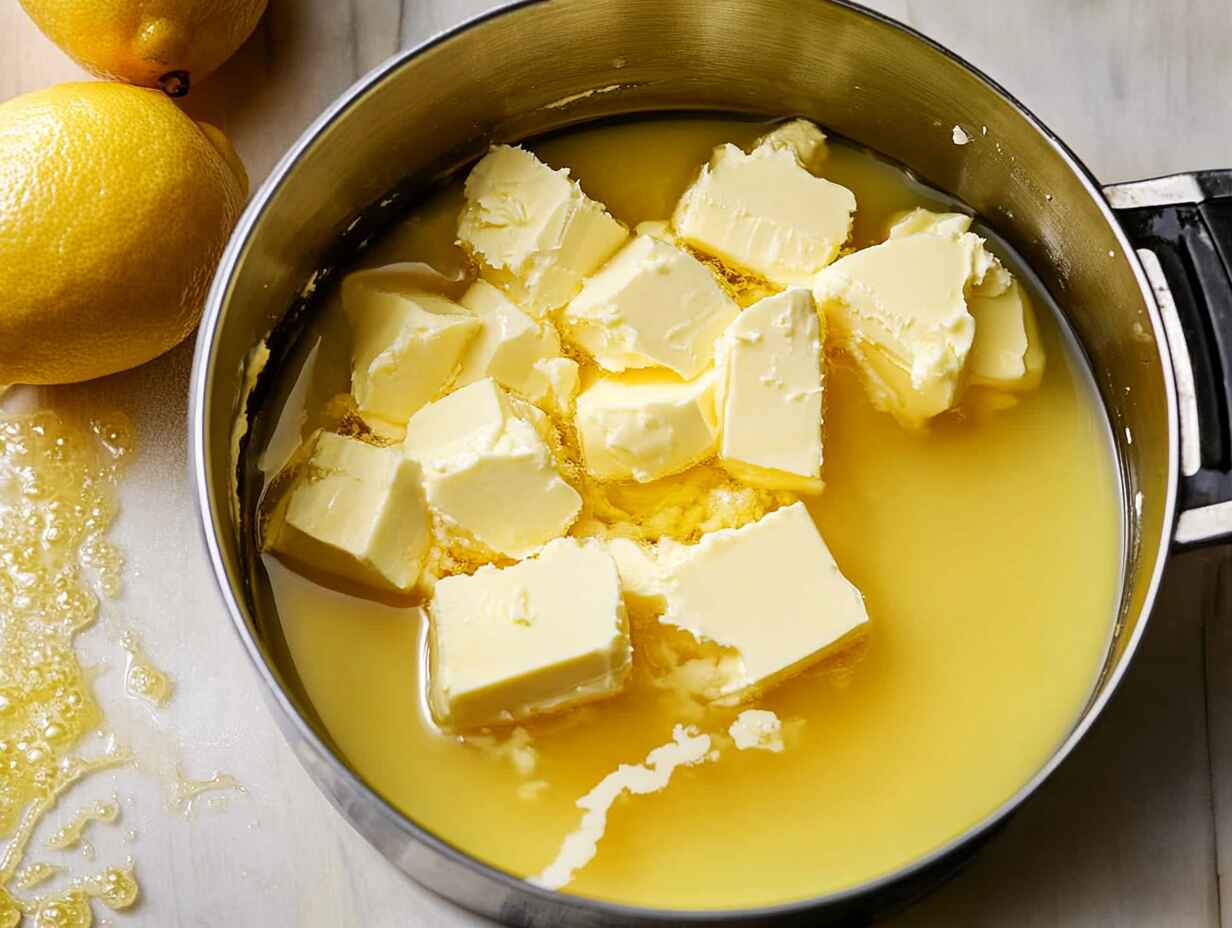
Factors that Contribute to Butter Curdling with Lemon Juice
Temperature of lemon juice curdles butter
The temperature of butter plays a crucial role in how it reacts with lemon juice. Cold butter is more solid and less emulsified, making it more likely to curdle when exposed to an acidic substance. In contrast, softened or melted butter is more stable and can integrate better with lemon juice under controlled conditions.
Amount of Lemon Juice Added: lemon juice curdles butter
The quantity of lemon juice added significantly affects whether curdling occurs. A small amount may be incorporated without breaking the emulsion, especially if mixed gradually. However, larger amounts of lemon juice increase acidity and disrupt the butter’s structure, leading to curdling.
When Does Lemon Juice Cause Butter to Curdle?
In Recipes with High Acidity: lemon juice curdles butter
Recipes that rely on a significant amount of lemon juice or other acidic ingredients can cause butter to curdle, especially if the butter is not properly stabilized beforehand. Examples include certain sauces or dressings where butter and lemon juice are combined.
When Lemon Juice make butter curdle Is Added to Cold Butter
Adding lemon juice directly to cold butter often causes immediate curdling. The acidic juice interacts with the solid fat and water phases in cold butter, breaking the emulsion and creating visible separation.
How to Prevent Butter from Curdling with Lemon Juice
Temperature Control: lemon juice curdles butter
To avoid curdling, ensure that butter is at room temperature or slightly softened before adding lemon juice. This allows for better incorporation and reduces the risk of breaking the emulsion.
Adding Lemon Juice Gradually: lemon juice curdles butter
Introduce lemon juice slowly while whisking or mixing continuously. This gradual integration helps maintain the emulsion and prevents sudden destabilization of the butter.
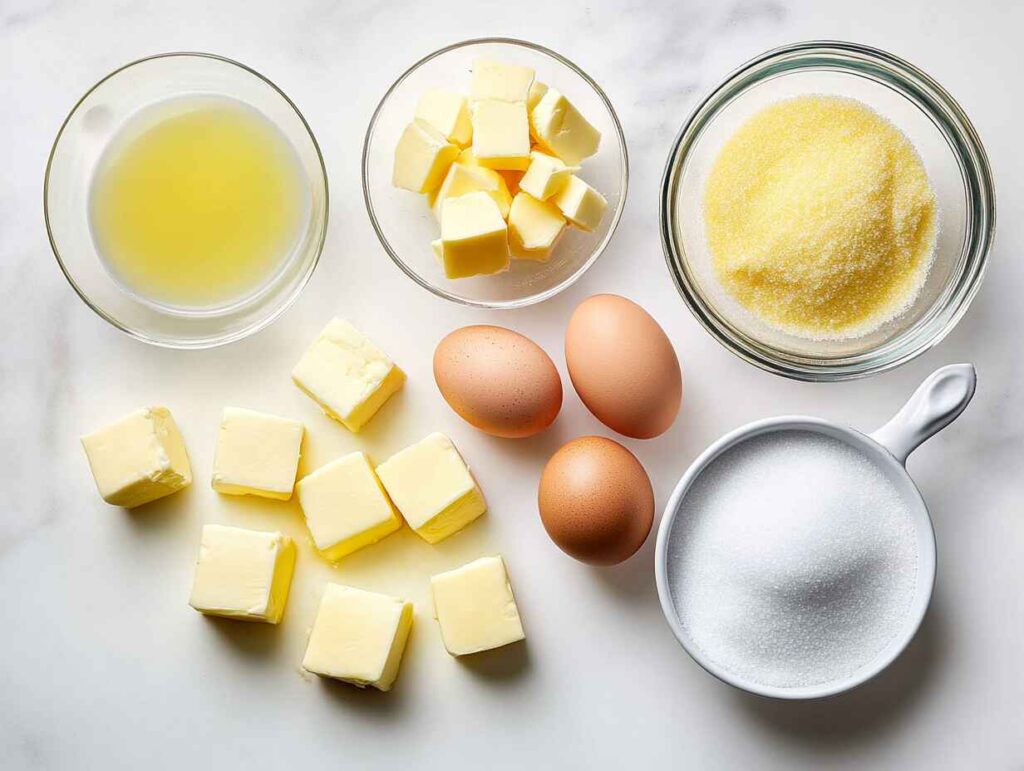
Alternative Methods to Use lemon juice curdles butter
Mixing Lemon Juice with Butter at Room Temperature
For a smoother combination, mix lemon juice with butter that is softened to room temperature. This method reduces the shock of acidity on the butter’s structure and allows for a more uniform blend.
Using Lemon Zest Instead of Juice: lemon juice curdles butter
To avoid curdling altogether, consider using lemon zest instead of juice. Zest provides the bright citrus flavor without introducing the acidity that can destabilize butter. This alternative is ideal for recipes requiring a smoother texture.
Would you like examples of recipes or more tips on managing the interaction between butter and lemon juice?
Common Recipes Where Lemon Juice and Butter Are Combined
Lemon Butter Sauce: lemon juice curdles butter
In dishes like lemon butter sauce or lemon chicken, lemon juice curdles butter if you add it too fast or when the butter is too cold. Mixing slowly and using warm butter can help avoid this.
Lemon Butter Chicken
Lemon butter chicken pairs the richness of butter with the tangy brightness of lemon juice. The butter is usually melted and combined with lemon juice to create a sauce or marinade for the chicken. Cooking at moderate heat and whisking continuously prevents the sauce from separating.
Practical Tips for Cooking with Butter and Lemon Juice
Stirring Techniques
Proper stirring techniques can help maintain the emulsion when combining butter and lemon juice. Use a whisk or a wooden spoon to mix ingredients thoroughly and ensure that the lemon juice is added slowly, allowing it to integrate evenly.
Choosing the Right Butter for Recipes
For recipes involving lemon juice, opt for unsalted butter, as it provides better control over the flavor balance. High-quality butter with fewer additives also tends to emulsify more effectively and resist curdling.
The Role of Lemon Juice in Baking and Butter Usage
Cakes and Cookies with Butter and Lemon Juice
In baking, lemon juice is often used to add flavor or activate leavening agents like baking soda. When combined with butter, the interaction is usually minimal because the ingredients are blended into a batter, stabilizing the emulsion. Cakes, cookies, and muffins often rely on this harmony to achieve a light, tender texture.
Why Butter Curdling Doesn’t Always Matter in Baking
Curdling in baking is not always a problem. If butter and lemon juice appear to separate slightly during mixing, the emulsion is typically restored when the dry ingredients are incorporated. Heat during baking further stabilizes the mixture, resulting in a cohesive final product.
Common Myths and Misconceptions
Does Lemon Juice Always Make Butter Curdle?
No, lemon juice does not always make butter curdle. The outcome depends on factors like the temperature of the butter, the amount of lemon juice added, and the method of mixing. With proper technique, the two can be combined smoothly in most recipes.
Is Curdling Always a Bad Thing?
Curdling is not inherently bad and is sometimes desirable in certain recipes. For example, curdling can be an intentional step in making clarified butter or certain types of sauces where separation enhances flavor. It’s only considered problematic when a smooth texture is critical, such as in emulsified sauces or dressings.
Would you like detailed recipe examples or troubleshooting tips for common issues with butter and lemon juice?
Butter is a versatile ingredient in cooking and baking, but its interaction with acidic ingredients like lemon juice can lead to curdling. This article dives into the science behind this reaction, practical tips to prevent it, and common myths surrounding butter and lemon juice.
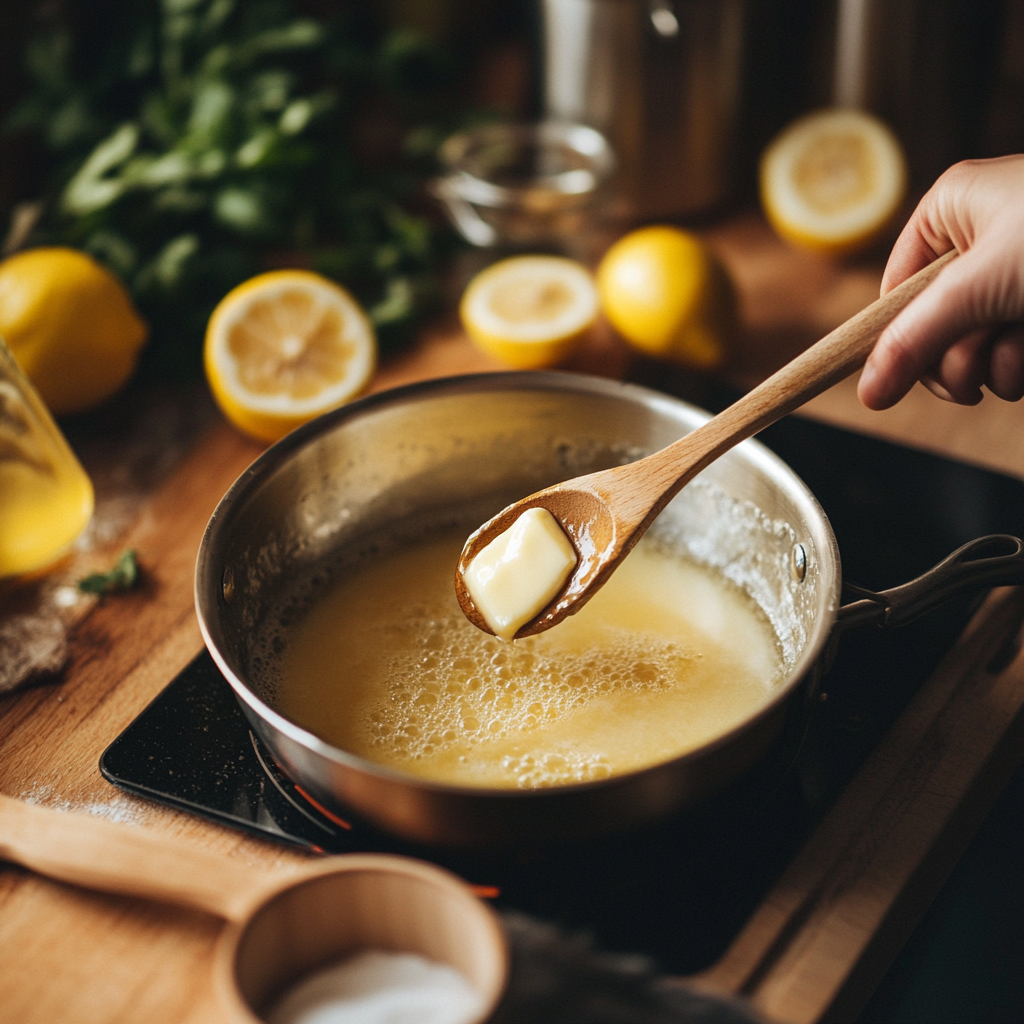
FAQs
Does Lemon Juice Make Butter Curdle?
Yes, lemon juice can make butter curdle. The acidity in lemon juice destabilizes the emulsion of fat and water in butter, leading to separation. However, this reaction is influenced by factors such as temperature, the amount of lemon juice, and mixing techniques.
How Can I Fix Curdled Butter?
To fix curdled butter, try warming it gently and whisking vigorously. This may help re-emulsify the mixture. Alternatively, adding a small amount of cream and blending can restore a smooth texture.
Can Lemon Juice Be Used with Butter in Cold Dishes?
Yes, lemon juice can be used with butter in cold dishes, but it requires careful preparation. Mixing softened butter with lemon juice at room temperature helps prevent curdling. Gradual addition and thorough blending are key.
What Other Acids Cause Butter to Curdle?
Other acidic ingredients like vinegar, yogurt, or lime juice can also cause butter to curdle due to their similar pH-lowering effects.
Is It Safe to Eat Curdled Butter?
Yes, curdled butter is safe to eat. While the texture may not be desirable in some dishes, the taste and safety are typically unaffected.
Can You Avoid Curdling When Adding Lemon Juice to Warm Butter?
Yes, curdling can be avoided by adding lemon juice gradually to warm butter while whisking continuously. Maintaining moderate temperatures and mixing slowly helps stabilize the emulsion.
Internal Linking Opportunities
For readers interested in related content, explore the following resources from Leemoe Recipes:
- Learn how to incorporate lemon and butter in a smooth and flavorful sauce with the Lemon Garlic Butter recipe.
- If you’re curious about preserving your creations, check out Can You Freeze Lemon Butter?.
- For more tips on managing lemon and dairy interactions, visit How to Add Lemon to Dairy Without Curdling.
Conclusion
Final Thoughts on Butter and Lemon Juice Interaction
Butter’s high fat content, usually around 80%, gives it its smooth texture and stability. The fat is the main part that holds everything together, forming a mixture that keeps the other ingredients combined. This fat is what makes butter melt easily and adds richness to food. However, because of its makeup, butter can break down when exposed to acids like lemon juice.
For additional insights and recipe ideas, don’t miss out on resources like Lemon Garlic Butter and How to Add Lemon to Dairy Without Curdling. Happy cooking!
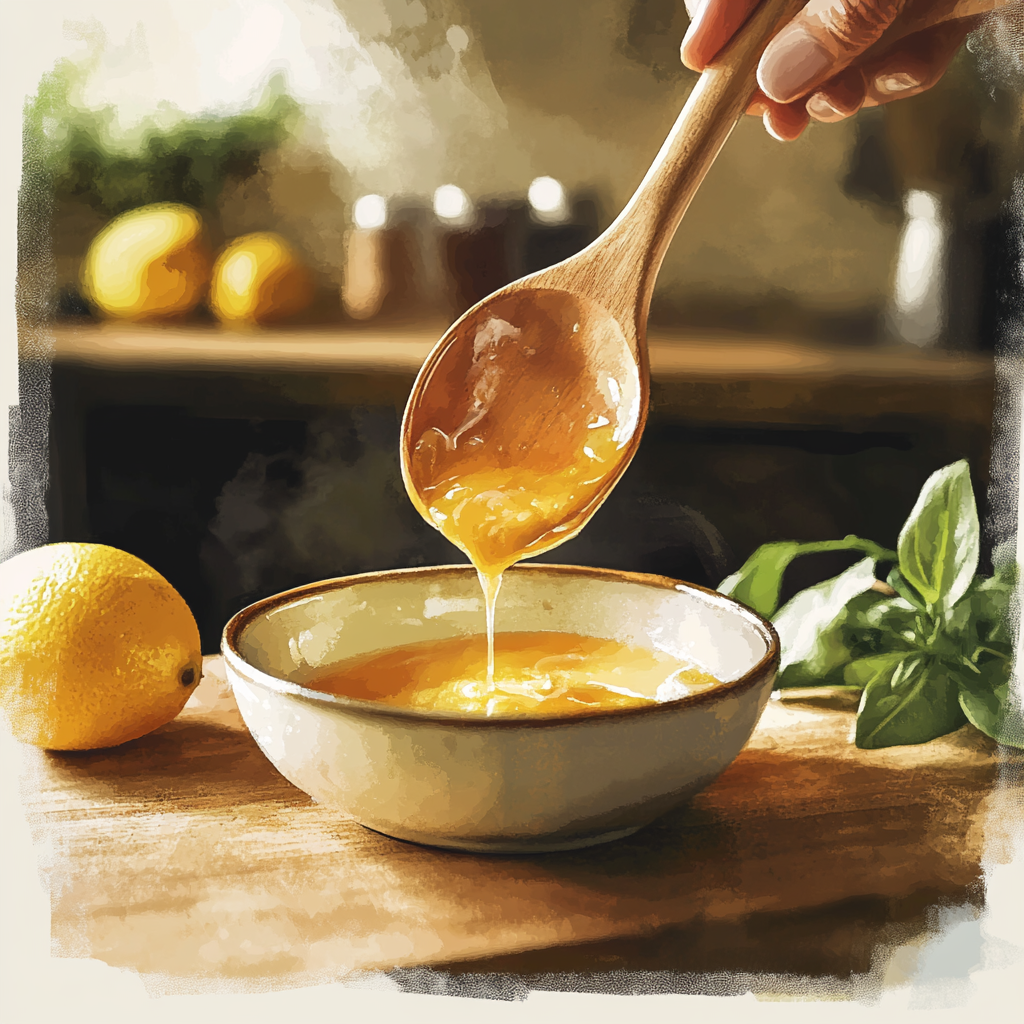

1 thought on “Does Lemon Juice Make Butter Curdle?”